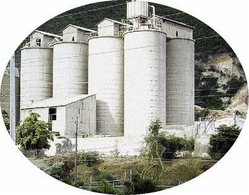Cement battle, Round 2
Published: Friday | September 4, 2009

Chris Bicknell, CEO of Tank-Weld Group.
The Tank-Weld Group has said it will "vigorously resist" an official complaint by Caribbean Cement Company which implies it is trading in dumped cement, while jibing the cement maker for cash flow problems that delayed the payment of salaries in August.
Caribbean Cement said Wed-nesday it has written to the Anti-Dumping and Subsidies Commis-sion (ADSC) requesting a probe into "the sale of unfairly traded cement" in Jamaica.
And while its release did not name Tank-Weld, the product it wants probed, Vulcan, is distributed in Jamaica by the Bicknell-run construction outfit.
Calls to all three ADSC lines went straight to a fax line but typically its investigations require complainants to back up their claims with proof of harm, and for the accused to respond, a process that can last for months.
Caribbean Cement said it has evidence, broadly citing the World Trade Organisation, that Vulcan Materials Company of the United States was selling cement to Jamaica at a cost "below fair market", the company charged.
No benefit
"This, however, does not translate in a benefit to Jamaican consumers as the low price offered by Vulcan is not reflected in the price of the imported cement on the local market."
Carib Cement charges that Vulcan is sold in Jamaica at a 71.53 per cent margin over what the distributor pays the American company for the product.
"It has been the practice of cement importers to hinge their prices to that ofCarib Cement, always setting their prices a little lower. Not even the consumer benefits from this unfair practice," said its release.
Tank-Weld said the blend it sells is superior.
"The cement that Vulcan is selling to Tank-Weld is Type 1S, which is a slag-blended cement that is not sold in the USA by Vulcan," said a seven-point rebuttal by Tank-Weld Chief Executive Officer Chris Bicknell.
"At the request of Tank-Weld, Vulcan blends the Type 1S cement specifically to exceed the Jamaican customer's expectations, by providing strength, durability and consistency beyond Carib Cement's product. In fact, the Tank-Weld Type 1S cement has been tested and proven to be a superior cement."
Price checks

Financial Gleaner checks indicate that a 94-pound bag of Vulcan retails for about $565 while Carib Cement sells for $650 to $680.
The Rockfort-based plant's new pushback against imports comes a week after Industry Minister Karl Samuda floated the Jamaican Government's intent to continuing safeguarding as much as 20 per cent, or 170,000 tonnes, for importers of the now estimated 850,000-tonne local market, leaving 80 per cent, or 680,000 tonnes, for Carib Cement.
The company sold more than 720,000 tonnes on the domestic market in 2008 but now has the capacity to produce some 1.8 million tonnes from its upgraded Rockfort plant, and has been lobbying for an end to the duty waiver - a 15 per cent Common External Tariff - that secures share for the importers.
The bigger the market share and the more sales it makes, the faster it can recoup the US$177 million poured into the upgrades, the cement maker has argued.
This week Carib Cement raised the issue again, saying it had "a debt to service".
At June 2009, the company had long-term debts of $2 billion and current liabilities of $2.8 billion. It also reported negative cash flows of $66.6 million at the sunset of its plant upgrade, six times the negative cash of $10 million in December 2008.
Explanation
Carib Cement has said clearly it can supply all of Jamaica's demand, but Samuda, in explaining his decision to extend the waiver - which still needs the imprimatur of Caricom's trade body, COTED, to become a done deal - said Carib Cement lacked storage space for inventory and would not, if faced with the test of disruption at its plant, be able to satisfy the market.
The cement maker's complaint to the ADSC is its latest volley in a trade war that went public in May when Carib Cement began fighting plans to extend the current duty waiver which expires September 9.
Tank-Weld is charging that Carib Cement simply wants to monopolise the market.
Bicknell, whose company entered the cement import and distribution market four months ago, says his company has only four per cent of the Jamaican market, while Caribbean Cement maintains share above 80 per cent.
"The anti-dumping complaint now brought by the Trinidad-owned Carib Cement shows clearly that it will resort to any action to achieve a closed market and the imposition of a monopolistic regime for cement," he said.
Bicknell charged that since Tank-Weld's market entry, Carib Cement has been forced to readjust prices and change behaviour with regard to customer service.
Tank-Weld has a 10-year contract with Vulcan for cement that it distributes from its shipping port in Rio Bueno, Trelawny.
The company has vowed to fight.
Completely misconceived
"Their anti-dumping complaint is completely misconceived and will be vigorously resisted by Tank-Weld," said Bicknell.
"Jamaican consumers of cement can rest assured that Tank-Weld will do its utmost to ensure that Jamaica is not returned to the days when we were at the mercy of a foreign-owned monopoly supplier of a product that is so critical to the national economy."
Caribbean Cement is owned by Trinidad's TCL Group.
Carib Cement has fought other importers with dumping charges before, and has come out ahead in those battles over Portland Grey cement from Asia.
mark.titus@gleanerjm.com




















